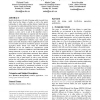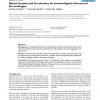237 search results - page 10 / 48 » An initial formal model for spatial data infrastructures |
KDD
2009
ACM
14 years 10 months ago
2009
ACM
Spatial classification is the task of learning models to predict class labels based on the features of entities as well as the spatial relationships to other entities and their fe...
SSD
1997
Springer
14 years 1 months ago
1997
Springer
Abstract: In many geographical applications there is a need to model spatial phenomena not simply by sharp objects but rather through indeterminate or vague concepts. To support su...
KI
2007
Springer
14 years 3 months ago
2007
Springer
How do we reason about spatial descriptions? In recent years a lot of research has been investigated in order to determine factors of complexity in spatial relational reasoning. S...
VR
2008
IEEE
13 years 9 months ago
2008
IEEE
It is widely recognized that inertial sensors, in particular gyroscopes, can improve the latency and accuracy of orientation tracking by fusing the inertial measurements with data...
BMCBI
2007
13 years 9 months ago
2007
Background: An adequate and expressive ontological representation of biological organisms and their parts requires formal reasoning mechanisms for their relations of physical aggr...


